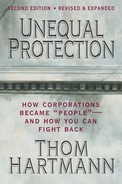0%
74Chapters
0-1Hours read
0kTotal Words
Book Description
Unequal taxes, unequal accountability for crime, unequal influence, unequal control of the media, unequal access to natural resources—corporations have gained these privileges and more by exploiting their legal status as persons. How did something so illogical and unjust become the law of the land?Americans have been struggling with the role of corporations since before the birth of the republic. As Thom Hartmann shows, the Boston Tea Party was actually a protest against the British East India Company—the first modern corporation. Unequal Protection tells the astonishing story of how, after decades of sensible limits on corporate power, an offhand, off-the-record comment by a Supreme Court justice led to the Fourteenth Amendment—originally passed to grant basic rights to freed slaves—becoming the justification for granting corporations the same rights as human beings. And Hartmann proposes specific legal remedies that will finally put an end to the bizarre farce of corporate personhood.
This new edition has been thoroughly updated and features Hartmann's analysis of two recent Supreme Court cases, including Citizens United v. Federal Election Commission, which tossed out corporate campaign finance limits.
Table of Contents
- Cover Page
- Title Page
- Copyright Page
- Dedication
- Contents
- Introduction: The Battle to Save Democracy
- PART I Corporations Take Over
- PART II From the Birth of American Democracy through the Birth of Corporate Personhood
- CHAPTER 3 Banding Together for the Common Good
- CHAPTER 4 The Boston Tea Party Revealed
- CHAPTER 5 Jefferson versus the Corporate Aristocracy
- CHAPTER 6 The Early Role of Corporations in America
- CHAPTER 7 The People’s Masters
- CHAPTER 8 Corporations Go Global
- CHAPTER 9 The Court Takes the Presidency
- CHAPTER 10 Protecting Corporate Liars
- CHAPTER 11 Corporate Control of Politics
- PART III Unequal Consequences
- CHAPTER 12 Unequal Uses for the Bill of Rights
- CHAPTER 13 Unequal Regulation
- CHAPTER 14 Unequal Protection from Risk
- CHAPTER 15 Unequal Taxes
- CHAPTER 16 Unequal Responsibility for Crimen
- CHAPTER 17 Unequal Privacy
- CHAPTER 18 Unequal Citizenship and Access to the Commons
- CHAPTER 19 Unequal Wealth
- CHAPTER 20 Unequal Trade
- CHAPTER 21 Unequal Media
- CHAPTER 22 Unequal Influence
- PART IV Restoring Personhood to People
- Acknowledgments
- Notes
- Art Credits
- Index
- About the Author
- Footnotes
